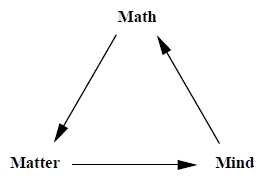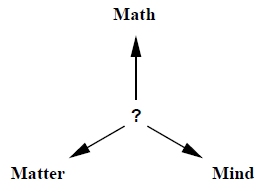Reading “The Wayward Mind” made me think, among other things, that we always deal with past writers/thinkers/whatever in a really close perspective. We always relate these figures to their own times and what was the cultural trend at that time. Instead we always put ourselves on a privileged, external position. Partly this is true because we do come “after” everything that we know. We’re surfing the wave that moves on and on. Riding on the edge. So as long as we’re alive we’re also ahead. Yet we perceive ourselves as objective and unbiased, free of ties and subordination. This must be so obviously a misconception. We know much more than an ancient Greek philosopher, but our condition isn’t significantly different. And we’re also stuck within our own time.
A possible interpretation is that the modern Quantum theories actually drive our beliefs. The post-modernity is the system we’re trapped in, and that system colors our sense of reality and of possibility.
 It’s curious that in the context of the purely agnostic (“we lack tools to understand what is really going on”) there are two opposite possibilities that seem quite popular these days. In one you could put Scott Bakker and a certain nihilism: the more we know, the more we realize we’re nothing. We decide nothing. Consciousness is not the center of the world, but the true fabric of the lie we cling to. We’re just trapped in a number of consolatory, vulnerable narratives that get constantly crushed under the heel of reality. The more you know the more you fail, because success is that vulnerable, erratic lie you tell yourself. It can only work as long you’re gullible, and quick on the self-deceit.
It’s curious that in the context of the purely agnostic (“we lack tools to understand what is really going on”) there are two opposite possibilities that seem quite popular these days. In one you could put Scott Bakker and a certain nihilism: the more we know, the more we realize we’re nothing. We decide nothing. Consciousness is not the center of the world, but the true fabric of the lie we cling to. We’re just trapped in a number of consolatory, vulnerable narratives that get constantly crushed under the heel of reality. The more you know the more you fail, because success is that vulnerable, erratic lie you tell yourself. It can only work as long you’re gullible, and quick on the self-deceit.
Then there’s the opposite belief. That we are world-creating devices. Having the powers of the Creator and shaping realities in ways that can be literal. In Constructivism the definition of “Observer” is: “who creates an universe”. Make some Google searches about “reality creator” and similar permutations and you come out with all sort of crazies, right with the first link you have there. That’s quite an absurd website, even if it can’t compare with Val Valerian’s Matrix. If you enjoy “mythologies” in general like I do, there’s plenty to have even if you don’t dig into Fantasy. People build the most complex and fantastical mythologies in THIS world.
This was also a curious perspective I came to on my own last summer, following some thoughts on the Malazan series. One thought I was toying with is about the “location” of god. God is usually an external agent because this property of being “outside” is required to explain reality. If the world is created, then the creator has to be out of the specific realm of the world. So being external means being authoritative. Pretty much all ideas of gods are about entities that sit outside, looking in. My idea was: what if the gods instead hide inside? Not inside the creation, but inside the dark corners of the soul. This specific perspective is exactly what most of “The Wayward Mind” is based on, so this personal speculation of mine wasn’t entirely shallow and hubris.
 But returning to the idea of the “reality creator”, what got my attention was the idea of responsibility. There’s some of this even in Von Foerster’s Constructivism. The “participatory universe”. If there’s no god and reality is “constructed”, then it means that humanity has its destiny in its own hands. There are no moral impositions if not those that men impart on themselves. It’s really up to you, you’re completely free. Morality becomes even MORE important than if there’s a god who’s going to judge you, because everything is at stake, and power at its maximum (it’s like the apex of Stan Lee’s most famous line). The model is even quite neat because it surfaces right from quantum theory (for the dummies) and explains why we’re not so omnipotent. The reality creator hypothesis relies on two big constraints. The first is that the process is not conscious, the obvious one, so what truly comes to happen is influenced by what you truly expect and believe, not directly what you “want”. The other constraint is about the “participatory” aspect. Everyone of us influences reality, so reality is more like an entity that manifests out of a collective mind (a Jungian “collective unconscious”). Some kind of large scale ritual that takes place and “evokes” what we consider our reality. So it’s obvious that our personal omnipotence gets only one “vote” on what is going to happen, like some kind of democratic model of reality.
But returning to the idea of the “reality creator”, what got my attention was the idea of responsibility. There’s some of this even in Von Foerster’s Constructivism. The “participatory universe”. If there’s no god and reality is “constructed”, then it means that humanity has its destiny in its own hands. There are no moral impositions if not those that men impart on themselves. It’s really up to you, you’re completely free. Morality becomes even MORE important than if there’s a god who’s going to judge you, because everything is at stake, and power at its maximum (it’s like the apex of Stan Lee’s most famous line). The model is even quite neat because it surfaces right from quantum theory (for the dummies) and explains why we’re not so omnipotent. The reality creator hypothesis relies on two big constraints. The first is that the process is not conscious, the obvious one, so what truly comes to happen is influenced by what you truly expect and believe, not directly what you “want”. The other constraint is about the “participatory” aspect. Everyone of us influences reality, so reality is more like an entity that manifests out of a collective mind (a Jungian “collective unconscious”). Some kind of large scale ritual that takes place and “evokes” what we consider our reality. So it’s obvious that our personal omnipotence gets only one “vote” on what is going to happen, like some kind of democratic model of reality.
As I said this fits nicely with the simplified idea of quantum theory we have. We dig down in the fabric of matter and continue to find smaller particles. Then at some point we figure out we can’t even determine their position, so small that it all becomes an abstract, almost metaphysical game of probabilities. The intuitive leap is about the human mind being able to influence these probabilities, being connected with the True Source, the energy that is in everything, the quantum foam, the aether. Which, since I’m now coming from “Bakker’s school”, is THE PROOF of being bullshit. It feels nice thinking up abstract, metaphysical theories that seem to explain so well a number of things, yet this simplistic, intuitive ease is exactly what undermines their validity. These theories “work” merely because they feel gratifying, not because they offer some actual insight. We believe in them because of how they feel, not for what they are. Wherever we see chaos, we imagine a pattern, and then we persuade ourselves that the pattern is “really” there. It’s similar to the “reality creator” principle, but it’s about our own bullshit.
Take these two broad ideas and you see how everything else kind of falls in the middle. They represent the two extremes. From a side human beings and consciousness as marginal entities whose whole existence is a big delusion, and from the other side human beings so central in reality that everything depends on them, they create it. Obviously, most people will tend to believe in what they like better, not in what it is more likely. Which reminds me a legitimate position to have (if the goal is targeting a tactical position to take).
Surprisingly, I found out that these discussions seem quite frequent and popular. For example I found them more than once while visiting that internet cesspit that is 4chan. A true cesspit in the original sense that gave the title to my old blog. A place filled with garbage, sometimes even disgusting, but also with piles of interesting stuff if you’re good at fishing. Some arguments I found were insane and rather messed up, for example the ideas of Tulpa and thoughtform. Especially the way they are pushed to the extreme: if you don’t like your life, what is wrong in deliberate hallucinations? I can actually see this working, but it’s not exactly something I associate with a pleasant experience.
Among one of these discussions I found a number of interesting links that I’ll repost as I found them. I’d link to 4chan, but it’s pointless because of its volatile nature. So here these links for posterity. Dig into them and you can find interesting (and crazy) stuff:
* http://iridia.ulb.ac.be/~marchal/publications/SANE2004MARCHALAbstract.html
* http://arxiv.org/abs/gr-qc/9704009
* http://arxiv.org/abs/0704.0646
* http://swc2.hccs.edu/kindle/theoryofnothing.pdf
* http://arxiv.org/abs/quant-ph/0011122
* http://arxiv.org/abs/physics/0510188
* http://arxiv.org/abs/0912.5434
* http://www.i-sis.org.uk/organis.php
From time to time, reading this stuff, you notice some baffling echoes. Take this for example:
The current textbook universe started in a big bang and consists of billions of galaxy clusters each containing billions of stars, probably many with a planetary system. But this is just the visible universe. According to inflation models, which are needed to explain the homogeneity of our universe, the “total” universe is vastly larger than the visible part.
The context of this is cosmology, but it echoes directly with a pattern we see in the human brain: what we see and presume to know is only a tiny part. So again the Russian Doll structure. These echoes are just too powerful to be random, but maybe too easy to be solved intuitively. What are they truly saying?
My intuitive theory is the Mise en abyme, what we see outside is a reflection. The cosmology we see is a model of consciousness. “Shaped like itself”. As large as the whole universe (and beyond), as small as the smallest particle (and beyond), spiraling into infinite. From infinite to infinite, endlessly repeating.
What to make of all of this I have absolutely no idea. I know it’s fascinating, and in “The Wayward Mind” there’s also something that describes why it is so fun, and why it has so much in common with “epic fantasy”, and why I like it so much:
“Our imagination loves to be filled with an object or to grasp at anything that is too big for its capacity. We are flung into a pleasing astonishment at such unbounded views, and feel a delightful stillness in the soul at the apprehension of them.”
In picturing vistas which dwarfed human beings, both in age and scale, artists such as Turner reminded their viewers of the power and grandeur of the natural world of which they themselves were a microcosm. Landscapes that are ‘huge, obscure and terrible’, said Edmund Burke, ‘arouse feelings that invigorate and elevate the mind’.

